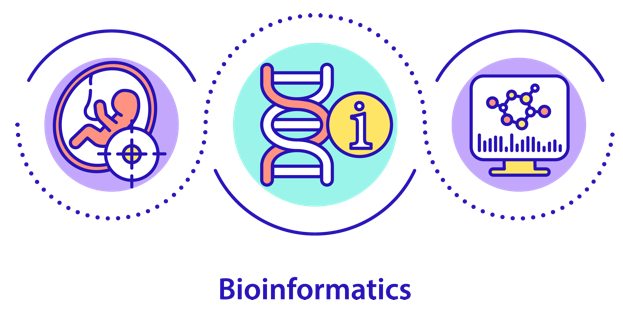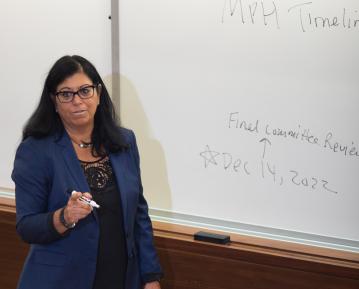Bioinformatics Tutor for Beginners
Bioinformatics Tutor for Beginners
Blog Article
Bioinformatics Tutor for Beginners
Table of ContentsUnknown Facts About Bioinformatics TutorThe Best Guide To Bioinformatics TutorThe 5-Second Trick For Bioinformatics TutorThe smart Trick of Bioinformatics Tutor That Nobody is DiscussingSee This Report about Bioinformatics Tutor
Of the total amount individuals associated with the training, 80% were students from public college establishments, while the continuing to be 20% came from exclusive establishments. To get approved for a certificate of participation, students were needed to attend a minimum of 90% of the complete training hours. As a result of this need, an impressive 95% of the individuals successfully gotten their certificates, having not only fulfilled the minimum participation requirements however additionally finished all assigned activities throughout the training.
Throughout the elevation of the COVID-19 pandemic, especially in between June and August 2020, the job group was charged with organizing specialized training in bioinformatics. This training was specifically focused on pupils from the study team Nucleus for Study in Applied Computing at the Federal University of Pará (UFRA) The adjustment to remote understanding platforms as a result of the pandemic created a possibility to explore new teaching approaches and digital devices that improved both reach and effectiveness.
To react to the expanding demand in the computing and life sciences fields, an innovative course was presented in 2020 titled Introduction to Maker Knowing. This course was made to offer an obtainable yet extensive overview of Expert system techniques, especially as used in bioinformatics. The program was accomplished over three months, from October to December 2020, and was supplied completely online through the Google Meet platform. This virtual layout allowed involvement from pupils throughout Brazil, several of whom might not have had the possibility to attend in-person sessions.
Some Known Facts About Bioinformatics Tutor.
Roughly 50% of the overall training hours were committed to practical activities where students constructed smart versions and applications in a variety of scientific domain names, including genetics, molecular biology, and environmental information analysis. These platforms allowed students to involve in real-time information control, version training, and formula experimentation.
Sixty of them were affiliated with various greater education and learning establishments in the state of Pará, while the staying twenty came from institutions found in 5 other Brazilian states. By presenting Artificial Knowledge in a practical and appropriate context, the initiative offered to link the space in between theory and real-world application, supplying trainees with a solid structure for future research study or employment in the field.
The training effort formed component of a broader academic outreach initiative referred to as the Bioinformatics when traveling job. This job has, for many years, introduced loads of trainees to the globe of bioinformatics and computational biology. The events held under this umbrella campaign have occurred across several regions and years, as summarized in Table 1 (Checklist of occasions, areas, years, and overall varieties of pupils and teachers)
One of the most amazing results of the Bioinformatics when traveling effort has been its contribution to the development of decentralized research study teams. Several of these groups, originally brought with each other by their involvement in training events, have because gone on to generate independent clinical research study in partnership with neighborhood academic organizations. The training not only promoted clinical reasoning within the context of bioinformatics yet likewise triggered joint partnerships that expanded past the training atmosphere. These partnerships have actually brought about raised neighborhood scientific performance and added meaningfully to the advancement of the broader bioinformatics area in Brazil.
How Bioinformatics Tutor can Save You Time, Stress, and Money.
The job itself was conceptualized and arranged by MB and RR, that looked after the planning and application of each action. Lectures were supplied by a multidisciplinary group including megabytes, FA, EF, KP, JS, DM, SN, LP, LG, RR, ac, and ih. The same team, omitting IH and RR, also worked as tutors for the functional training modules. Funding for the project was given via the give 88887.200562/ 2018-00 from CAPES. The writers prolong their thankfulness to everyone who added to the awareness of this task, whether straight or indirectly, because its inception.
The Federal College of Pará's Office of Research (PROPESP/UFPA) also offered financial backing, especially for the manufacturing of the final manuscript. The authors state no monetary or industrial problems of passion that can have affected the research. All analyses and find point of views revealed in this post are entirely those of the authors and do not necessarily reflect those of their corresponding establishments, the author, editors, or reviewers entailed in the publication process.

Our Bioinformatics Tutor Ideas
From an instructional viewpoint, the teaching strategy made use of in the training was purposefully interactive. Courses were carried out in a way that encouraged pupil participation and conversation, exceeding rote memorization to explore exactly how concepts are established, applied in every day life, and tested in academic setups. The educational approach focused on supporting both solid and having a hard time trainees, offering individualized support, and structure self-confidence through sustained mentorship and persistence.

Each team, including around 36 individuals, was sustained by three coaches-- a lot of whom were postdoctoral scientists with specialized proficiency. These coaches not just assisted design the team projects yet additionally promoted their implementation, ensuring that each research study concern was both appropriately tough and relevant. The goal was to give a naturally realistic context that individuals could check out through flexible objectives and accessibility to curated datasets.
For extra understandings right into the methodology and results of this project-based understanding approach, visitors are routed to S1 Text, which includes thorough descriptions of the pedagogical framework, examination find more methods, and task themes utilized in the training sessions.
10 Easy Facts About Bioinformatics Tutor Explained
Of the total individuals involved in the training, 80% were trainees from public greater education and learning institutions, while the staying 20% came from exclusive institutions. To certify for a certification of participation, pupils were needed to go to at least 90% of the overall training hours. Significantly, past the trainees that signed up in the training sessions, 7 experienced teachers participated in discover here delivering the programs, while 3 committed study teachers worked with the total training process. Around 50% of the overall training hours were dedicated to functional activities where trainees built smart versions and applications in an array of clinical domains, consisting of genes, molecular biology, and environmental information analysis. The training not only fostered clinical reasoning within the context of bioinformatics yet additionally triggered collective partnerships that prolonged beyond the training environment.
Report this page